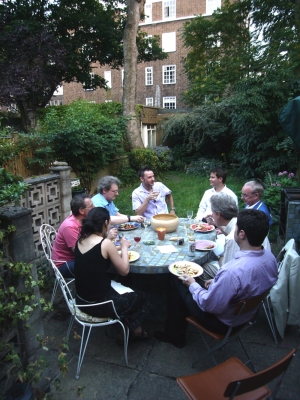In what bizarre universe is this guy ‘liberal’ while someone like me – who is strongly pro-gay marriage, pro-easy availability of pornography, against the stupid drug war, and stridently anti-authoritarian – is often described as ‘conservative’? If he’s a liberal, I’m a Prada handbag.
– Jackie Danicki
|
|||||
|
Or, rather, Independence Evening, which brought a motley crew of celebrants to Chelsea for some of Adriana’s salad, Nancy’s pasta, and some rather scandalous conversation. What is said at Samizdata HQ stays at Samizdata HQ, but a few of the photos can – as ever – be shared…  Three authors, an editor, an engineer, an actress, a Cambridge student, and a Brian
Three authors, an editor, an engineer, an actress, a Cambridge student, and a Brian
 Two patriotic pavlovas (with thanks to Nigella)
Two patriotic pavlovas (with thanks to Nigella)
 The author of London Gazetteer and Hidden London dressed in theme, making his t-shirt especially for the party!
The author of London Gazetteer and Hidden London dressed in theme, making his t-shirt especially for the party!
 The ladies of Time to Spa thought it was time to party
The ladies of Time to Spa thought it was time to party
 Now that she had cleaned her plate, Jo hoped to be granted a refill of vino
Now that she had cleaned her plate, Jo hoped to be granted a refill of vino
Thanks to all who braved the heat to come along, and do not worry – your secrets are safe with Samizdata… Mike Hudack of blip.tv wishes all a happy Independence Day with a few thoughts worth noting:
His personal hero of the American revolution is Thomas Paine, the author of Common Sense, whose arguments created conditions for writing the Declaration of Independence.
It is allowed to be idealistic today:
Such words are very encouraging, especially coming from someone who has set up and runs a videoblogging community. It means that this particular community and the company behind it is driven by an understanding of the profound impact that individual creativity and its distribution will have on the future. And, surely, that is a Good Thing. This is daft:
But, it is entirely legal, given the state of the law these days. Someone says something is offensive, and if they say it is offensive it is offensive, because offensive is whatever offends anybody. Then, once the complaint is made, the police are legally obliged to inflict over-the-top and ridiculous summary justice.
Quite so. I reckon that a creative application of this law could render illegal just about any damn thing anybody took against, definitely including the Police, Tony Blair, etc. Has Tony Blair never used language that was “deemed to cause harassment, distress or alarm at an event”? Selling the Koran would definitely be illegal, provided only that the Police received the complaint about it through the proper channels. My guess is that Police morale is now so low that a lot of them are now in Good Soldier Schweik mode, i.e. doing every stupid thing that the law says they must, just to show everyone how ridiculous the law now often is. My late father, who was a rather distinguished lawyer, used to tell us about a bloke who sat in Whitehall somewhere looking at all new laws that they were threatening to pass, pointing out inconsistencies and collisions with other laws, and unintended but possible consequences, and then deftly rewriting all the laws so that they achieved only what they were intended to achieve, and stopped only what they were supposed to stop. (He himself, apparently, had no firm opinions about what the law should do, other than what the people passing it said they wanted it to do.) Then he died, and they were never able to replace him. That must have been, if I remember it rightly, round about forty or fifty years ago. And that, my dad reckoned, was when, legally speaking, the rot set in. There is a fine article in the Telegraph rebutting anti-Americanism and another which features a splendid quote from an unnamed US embassy spokesman who responded to claims that a poll has found many British people are opposed to the US decision to overthrow Saddam Hussain and suggesting many had a low opinion of US civil society:
Quite. Never apologise to your enemies. One of my favourite blogs just now is China Law Blog. Its writers are very pro-freedom and pro-capitalist, and are optimistic about the future progress of China, both economically and politically, despite all the present miseries, muddles and horrors. A recent post there by Dan Harris is about the relationship between the rise of capitalism in China, and corruption. The cliché is that the former causes the latter, by providing the money for it. The price of politicians in China is being driven up by the increased amounts of money now available to pay for them. Ergo, there is more corruption in China now, because there must be. Besides, better to blame corruption on the evil capitalist buyers of politicians than on the sellers, the corrupt politicians themselves. But the picture Harris paints, helped by a recent World Bank study, written about by one of its authors in Newsweek, is that corruption, which was already a well-established fact in China well before capitalism got into its recent stride there, inhibits capitalism. However, once relatively uncorrupt, relatively uninhibited capitalism gets established and starts to spread, well, it spreads, and with it spreads the habit and the idea of non-corruption. The deeply corrupt and long established industrial cities, with their big state-owned enterprises, have remained corrupt, and have stagnated. The new industrial cities, many of them near to the coast, had pretty much no industry a generation ago, and hence no old industry to protect with corrupt and discriminatory measures against new enterprises. In these newly erupting cities, corruption is not nearly so great. That is why they are erupting. The claim that capitalism causes corruption is wrong. Lack of corruption causes capitalism, and capitalism diminishes corruption by rewarding its absence. Coastal cities. Lots of new industry. Openness to global ideas and influences. Sounds familiar, does it not? It is as if those Four Tigers are now raising a mass of tiger cubs on the mainland, and I bet you that lots of the exact same people who made the first tigers are now deeply involved in raising the new litter. China, viewed from a distance, through blog postings and news stories, now seems very Victorian British to me. Yes there is a universe of Dickensian misery, but there is also a rising commercial class and a rising puritanical zeal for honesty, first established by those who do trade and by those who see the point of trade, but now, it would seem, starting to infect political activity. Meanwhile, democracy advances, step by little cautious step, just as it did in Victorian Britain. At present, the big deal is that they are allowing elections for Communist Party posts, and expanding the Communist Party. Sort of like how the Victorian aristocracy of Britain co-opted the new capitalists, and also became much more productive sorts of capitalists themselves. For more about this process, see this article. Others, equally devoted to the spread of the free market (they would say more so), like these guys have a much gloomier view of modern Chinese development. The fat cats of state capitalism have merely found a new way to skim off the cream. They have a point. Like Victorian Britain, China now is a harsh and unfair place, unless you are one of the lucky ones who is working hard and is being rewarded. To switch metaphors from cats to cookery, at least now in China, amidst all the broken eggs, there is the beginning of a seriously tasty omelette to be seen sizzling in the frying pan. A few decades ago, all they had to show for their broken eggs was broken eggs. I feel that the referee handled the Rooney thing badly – failing to whistle at all during the long physical assault on Rooney by three Portuguese players, then applying the law to what might have been an accidental stamp in the most draconian way. He’d also failed to give England a cast-iron penalty – but otherwise, I felt he had as good a night as might be expected in such a difficult match. – James Hamilton proving, by being just a tiny bit too rational and even-handed about it all, that he is not entirely English Like many folk, I get my fair share of free newspapers pushed through the letterbox. These publications live on advertising and in some cases are quite useful, full of details about local plumbers, plasterers, doctors, new restaurants and the like. In my central London neighbourhood of Pimlico, there are a few of these things floating around. I normally give them a cursory glance and either jot down any handy numbers or put the rag into the trash. The Pimlico and Belgravia Eye has this interesting ad which definitely caught my eye (not available online):
Pole dancing – now associated with ’empowerment’ and ‘professional career development’. Say what you like about we stuffy Brits – there is none of that stuffyiness in deepest Pimlico. Here is their, ahem, website. A few days ago former Clinton Secretary of State Madelein Albright condemned the American Libraries Association (ALA) for its tepid response to the Cuban state’s repression of intellectual freedoms by its policies of banning certain books and imprisoning independent librarians who do not follow the party line. However all I ever need to know about the ALA is revealed in this article with the line “But she won her loudest applause for oblique slaps at President Bush”. Hostility to Bush roused the emotions of more ALA librarians than defending oppressed librarians in Cuba. Of course that Americans are more concerned with American affairs is hardly surprising but when an organisation decries its government’s leadership at home on civil rights grounds and yet balks at heaping any significant opprobrium on an old style communist tyranny off the American coast, I think this is an organisation that can be safely consigned to the useful idiots category. No doubt many in the ALA are impressed by the more than ten fold increase in the number of public libraries under Castro, ignoring the fact that these libraries can only stock books which are not deemed ideologically unacceptable by the regime. Somehow I rather doubt books by the oafish Michael Moore or Marx are in any shortage in the American libraries presided over by the ALA (and rightly so).  I am just having a relaxing weekend out of London. Dublin (and Ireland in general) is a delightful place, and is perfect for a relaxing weekend. The absence of immigration controls between Britain and Ireland means I do not have to spend an hour and a half in the non-EU nationals queue when I get back to London, which is also good. I have been to other parts of Ireland, but somehow I find I have not been to Dublin since 1997, which is far too long. I am presently in a cafe just off Grafton Steet, which has properly civilized free WiFi, and I have been reading Vernor Vinge’s Rainbow’s End in cafes and bars and airports. It is good, but not as overwhelming as A Deepness in the Sky. Vinge is amongst the greatest sf writers currently writing, but I do not think it is quite one of his major works. I will reserve judgement on that until I reach the end of the book. An episode of Dr Who last year was based on the idea that there was some sort of cosmic energy source in Cardiff, and the Doctor and Rose (as well as the villain of the story) went to Cardiff to in some sense feed on the Energy source. This idea that some places are special, and have deep religious significance and healing properties, or special magical powers, or are the locations of gateways between universes or similar, is of course one which exists throughout religion, mythology and fiction. But when I wander around a city looking for a WiFi hotspot I am struck by the sense that it has become in some ways literally true. WiFi hotspots are places where the magic of the modern world works in a way that it does not in other places. I am fully connected to the world, whereas when I am outside one I am restricted to using cellular networks, which have bandwidth restrictions and pricing systems that are generally so clueless that I am unable to use them in the way that I would like (well, if they are not clueless they are so determined to not lose their voice revenues that there are lot of services and pricing schemes they simply will not consider). This gets much worse when I am outside my own country and I have to pay idiotic roamng charges. Recent studies have actually tended to suggest that for people paying their own bills, reducing roaming charges actually increases revenues rather than reduces them, because halving the cost causes to speak to people for more than twice as long. However, there is again a “We do not want to lose existing revenues” factor, as the majority of revenues presently come from business users who do not pay their own bills. Of course, it is not an original observation that computers and magic are similar in peculiar ways. Programming a computer is almost literally the same thing as casting a spell. You write down words, and things happen in a real world as a direct consequence of the words you utter. A program is an incantation. You get the words even slightly wrong, and bizarre and unpredictable things happen, just like in so many magical stories and legends. Computer hacker lore is full of references to wizards, and demons, and gods. Arthur C Clarke wrote a long time ago that “Any sufficiently advanced technology is indistinguishable from magic”, but I think even he failed to predict the extent to which this has, almost literally, become true (Vinge of course understood this before anyone). I can not imagine that WiFi hotspots being special places will last for long though. We are going to have ubiquitous and fast wireless data networks almost wherever we go before long, just as we already do for voice networks. Finding a place without the equivalent of a hotspot is going to be like finding a place without cellular coverage – not all that uncommon, but annoying. By the way, I am in an outlet of a chain called Cafe Java, which in addition to free WiFi and what looks like rather good food, has a fine tea selection as well. There gets a point where I have had enough coffee, and switching to green tea (which is what I am drinking now) or similar is my preferred approach. I wish someone would open one of these near where I live, or indeed a chain of them all over London. Also, what in the name of Allah is that giant vertical silver thing that has been erected in the middle of O’Connell Street?  |
|||||

All content on this website (including text, photographs, audio files, and any other original works), unless otherwise noted, is licensed under a Creative Commons License. |
|||||
 The first
The first 



